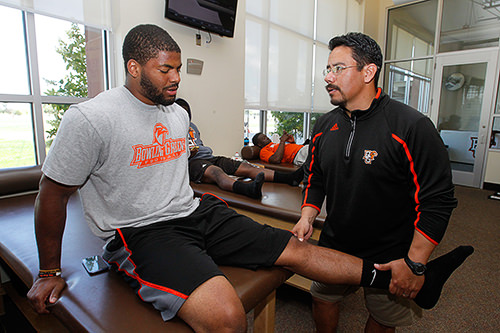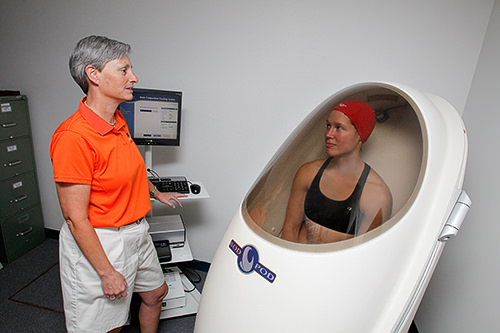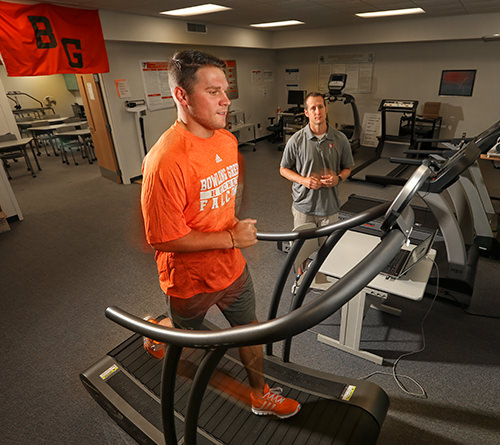Sport Performance leverages faculty passion and expertise
 Assistant AD for Sports Medicine Alfred Castillo leads the Sport Performance team.
Assistant AD for Sports Medicine Alfred Castillo leads the Sport Performance team.
By Pete Fairbairn
As one of the nation’s top public universities, BGSU is well known for academic excellence and a faculty that is dedicated to the success of its students. The Sport Performance program, and the vital participation by faculty from the Department of Psychology and the School of Human Movement, Sport & Leisure Studies, is a prime example of the commitment and expertise behind this reputation.
Sport Performance takes a comprehensive, wholistic approach to not only issues of athletic performance, but of health and wellness. The innovative program was the brainchild of former Assistant Athletic Director for Sports Medicine Doug Boersma and Head Team Physician Jeffrey Noftz. They both saw the need to provide a more integrated approach, and the exciting possibilities of bringing the academic resources of the University to bear on individual student-athlete and team needs.
The current head of Sports Medicine, Alfred Castillo, implemented a similar program prior to coming to BGSU, and is a firm believer in the importance of bringing together athletics and academics in support of Falcon student-athletes.
 Dr. Amy Morgan speaks with Falcon Volleyball’s Kelsey Bates, who is in the BOD POD® having her body composition analyzed.“Our team includes experts in the fields of nutrition, exercise physiology, body composition, sport psychology, sports medicine, and strength and conditioning,” said Castillo. “Ultimately, this is what our student-athletes and coaches want — student-athletes come to us in order to reach their full potential, and I believe this team provides us with the best platform to do that.”
Dr. Amy Morgan speaks with Falcon Volleyball’s Kelsey Bates, who is in the BOD POD® having her body composition analyzed.“Our team includes experts in the fields of nutrition, exercise physiology, body composition, sport psychology, sports medicine, and strength and conditioning,” said Castillo. “Ultimately, this is what our student-athletes and coaches want — student-athletes come to us in order to reach their full potential, and I believe this team provides us with the best platform to do that.”
The ideal process usually involves a coach who requests a service for his or her team, or on behalf of an individual or group with particular issues or needs. For example, the coach might let Castillo know that an individual could use some input from Sport Psychology. In turn, Castillo and his staff would make the necessary arrangements with Dr. Vikki Krane.
“I focus on the ‘performance enhancement’ aspect of sport psychology,” Krane said. “My role is to teach skills to help the athletes achieve their goals, including how to manage anxiety, and using imagery to enhance performance and focus their attention for more consistency.”
Krane also noted that individual student-athletes are encouraged to approach the Sport Performance team via Castillo’s staff when needed. Student-athletes also can contact her directly. The process is designed to protect the privacy of individuals who are having problems or issues where they would prefer to maintain confidentiality. For example, Assistant Professor of Clinical Psychology Dr. Dryw Dworsky may be called upon by student-athletes seeking help with mental health issues.
Further demonstrating the strong affinity between athletics and academics is Director of Strength & Conditioning Sean Edinger, who also happens to have a master’s degree in Sport Psychology.
“Every day we’re asking the athletes to strain and put forth a high amount of effort, and that can be very uncomfortable. We work to create the right environment and atmosphere for high performance as well as health and wellness.”
-- Director of Strength & Conditioning Sean Edinger“We’re not so much strength coaches as effort coaches,” observed Edinger. “Every day we’re asking the athletes to strain and put forth a high amount of effort, and that can be very uncomfortable. We work to create the right environment and atmosphere for high performance as well as health and wellness, but sometimes your body just isn’t up for it.”
Often, that’s where nutrition coaches Carrie Hamady and Chris Haar are invited to come into the picture.
“The goal is to help the athletes to perform at their best for games or meets, but also at practice, Hamady said. “If individuals feel their performance is slipping or could be better, it’s probably a good time for an evaluation of their fueling practices by a nutrition coach.”
Also helping individuals, coaches and entire teams to understand important underlying factors in the science of Sport Performance is Dr. Amy Morgan, who works with her graduate students to provide data on body composition utilizing the BOD POD®, which analyzes the percent of body fat and lean tissue.
“Our goal is to follow teams across the season to determine if they are maintaining muscle over that time, which may explain a loss in performance,” Morgan said. “We can share this information with the strength and conditioning and nutrition experts to determine what we can do to help the athletes maintain muscle during the season.”
Optimizing performance now as well as assuring long-term health and wellness is also at the center of what Dr. Matt Laurent does in the area of exercise physiology.
 Dr. Matt Laurent designs and administers tests that help student-athletes and coaches determine optimal training regimens“I sit down with the coaches and find out what they want to know,” Laurent said. “For example, in the area of fatigue, I will design a test that shows how the players are fatiguing and how they recover. Then, my colleagues and I can come up with a protocol to manage training loads that won’t burn out the players.”
Dr. Matt Laurent designs and administers tests that help student-athletes and coaches determine optimal training regimens“I sit down with the coaches and find out what they want to know,” Laurent said. “For example, in the area of fatigue, I will design a test that shows how the players are fatiguing and how they recover. Then, my colleagues and I can come up with a protocol to manage training loads that won’t burn out the players.”
Senior Associate AD Lesley Irvine pointed out that all faculty members of the Sport Performance team are working on a volunteer basis, going well above and beyond typical service expectations at the University.
“We don’t have the financial resources to hire full-time staff dedicated to this area,” observed Irvine.
“What we do have are passionate, engaged faculty members who truly care about what they are doing and want to contribute to the success and well being of our student-athletes. We greatly appreciate these talented individuals who have made such a big difference.”
Updated: 05/14/2019 01:56PM
